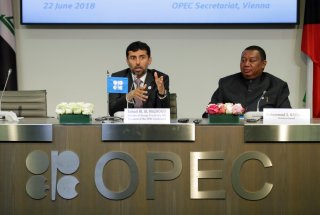Oil Prices Down After UAE Pledges to Increase Production
An OPEC production increase represents the best chance of quickly restoring normal oil prices.
Global oil prices, which shot up after President Joe Biden’s announcement of sanctions against the Russian energy industry earlier this week, decreased significantly on Wednesday—from around $125 per barrel to around $110—after the United Arab Emirates (UAE) pledged to increase its oil production.
Yousef al-Otaiba, the UAE’s ambassador to the United States, announced on CNN that Abu Dhabi would seek to increase oil production in the coming weeks in response to the market distortions caused by the ongoing Russia-Ukraine war. The Emirati ambassador also claimed that the UAE would pressure OPEC to “consider” supply increases across the board. "The UAE has been a reliable and responsible supplier of energy to global markets for more than 50 years." Otaiba said, adding that the UAE “believes stability in energy markets is critical to the global economy."
If Abu Dhabi’s advice is taken, it would represent a sea change for the international oil cartel, which had previously committed to continuing its plan of slow production increases, even as chaos has gripped global energy markets due to the Russian invasion of its western neighbor. Although it is not in OPEC, Russia is a member of “OPEC+,” the extended alliance between OPEC and other large oil-producing nations.
On March 2, OPEC+ announced that it would start increasing its collective output by 400,000 barrels per day in April. Oil observers noted that this move would not significantly correct for Russia’s reduced presence in the international market, as Moscow produces ten million barrels per day.
While the United States banned the importation of Russian energy and said that tankers carrying Russian oil would be turned away from U.S. ports, it produces much of its own oil and sources only a fraction of its own imports from Russia. By contrast, the European Union, which receives roughly half of its energy from Russia, has indicated that it believes a blockade of Russian oil and natural gas would be too disruptive to the European economy.
In the face of OPEC’s previous reticence, the United States has looked to individual nations for oil supplies. These possible new trading partners include Venezuela, which had previously been heavily sanctioned in Washington. It has also pushed for a rapid return to the 2015 JCPOA nuclear agreement with Iran, which would remove international sanctions on Iranian oil and allow Tehran to trade freely again.
However, an OPEC production increase represents the best chance of quickly restoring normal oil prices, as most OPEC nations are operating at less than full capacity and have the required infrastructure to rapidly increase production.
Trevor Filseth is a current and foreign affairs writer for the National Interest.
Image: Reuter.

